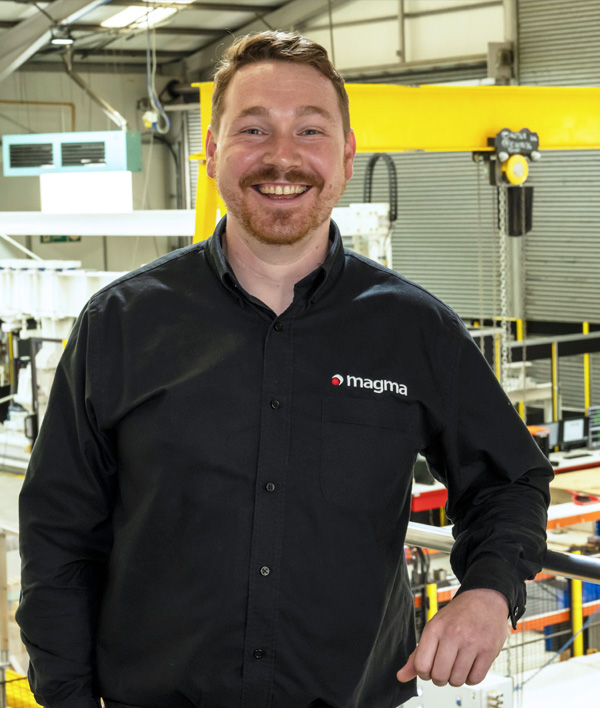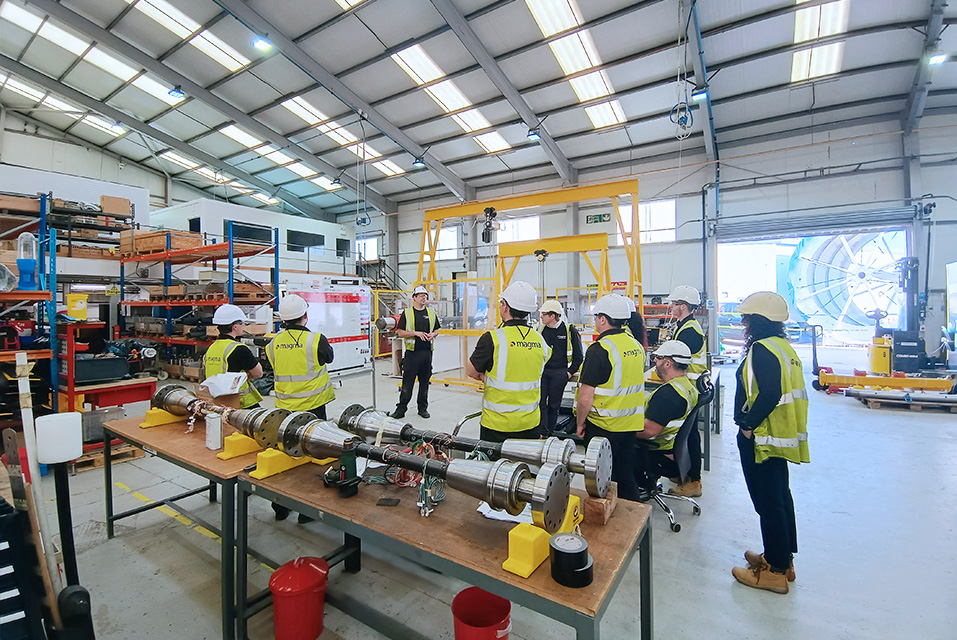Magma’s culture, diversity of experience and working practices exert a powerful draw for candidates. Josh personifies the company’s qualities, so we’ve asked him to share his take on what makes it such a good employer, and why it’s demonstrably somewhere graduates want to work, enthused by recommendations from friends and peers.
Thank you Josh for your time and your insights - over to you.
The Magma Global culture
As Magma Global approaches its 15th anniversary, it feels like a good time to reflect on how far the company has come. As a disruptor in its field, Magma attracts people who are motivated, smart and able to thrive in a challenging and continually evolving environment.
We recruit a lot of degree-qualified mechanical engineers, material scientists and other engineering professionals; we’ve had a lot of success hiring talented, junior individuals who can be trained in the Magma Way, which simultaneously widens the available talent pool, gives mentoring opportunities, and allows us to provide valuable work experience, but finding experienced people who fit our company profile can be a challenge. As the business grows, we require even more niche experience in fields such as composites, robotics and control, advanced manufacturing, materials, and Lean management techniques, so we’re looking at people with transferable experience from other industries who bring new ideas and perspectives.
Magma develops technology that’s ahead of the curve; if nobody makes the equipment we need, we invent our own. For example, there aren’t many off-the shelf test rigs that can deal with the forces, pressures and temperatures we need, so we spend a lot of time developing and building our own brand new systems and test rigs in-house. That might provide an insight into the kind of mentality we look for in candidates! There are a few key areas we’ve really focussed on to make sure Magma can achieve our challenging objectives while being a great place to work, which we can go through in a bit more detail.
Creating ownership
Over the last five years in particular, we’ve worked hard to develop a culture of empowerment and ownership that extends to everybody in the business. We encourage and help employees to embrace new challenges and expand their comfort zone, whilst ensuring that the right support is in place and helping individuals to progress to achieving their wider career and life goals.
To make it real for the team, empowerment has to be built into our working practices and not just be something that managers talk about. To achieve this, we’ve created processes where people collaborate and problem-solve together as a standard way of working. We do our best to ensure everyone is on the same page and has access to the same information, so if a decision turns out to be the wrong one, everyone understands why it was made.
For example, before each group of tests, we hold a pre-mortem exercise with the relevant team: analysing what could go wrong and what might cause it. The aim is to give everyone a voice and proactively work together to make things safer and better, rather than relying on individual heroics. We also have “lessons-learned” meetings afterwards, to review and share what worked and what didn’t, so that everyone can benefit from the outcomes. It’s important to celebrate the wins during these reviews as well as the negatives, because major lessons can be learned from both.
To expand on this example, this means that our test technicians are involved in the overall project planning so they understand why a task is required and the wider impact their work is having on the business. This can make a big difference if you’re doing challenging development work, as the contextualisation gives you both freedom and confidence to make quality decisions. To make this culture work, we pay attention to psychological safety: ensuring the whole team feels empowered to make decisions and take risks, which means seeing mistakes as part of learning and not something to hide.
 Building trust into teams
Building trust into teams
We’ve worked hard to create a culture grounded in mutual respect, where individuals and teams are trusted to do their best work and supported to grow. Trust is an essential ingredient in giving our teams real autonomy and the authority to make decisions. We focus on building trust gradually, allowing individuals to take on more responsibility as they grow in confidence and experience. This approach helps create a team that’s engaged, accountable and empowered.
Lean Transformation
Magma is currently working on a company-wide Lean Transformation; trying to improve the way we work by really focussing on our purpose, continuously improving our practices and processes and aiming to minimise any waste of time or resources. The key areas we’re focussing on are our management system (Obeya), people development, problem solving and continuous improvement.
At the centre of our Lean transformation, we’re setting up an Obeya system to help us align across the business. The word is from the Japanese for “big room”; it’s like the old idea of a war room, but instead, used for open collaboration. It’s a tool for visibility, alignment, and encouraging people to speak up and contribute. It supports our Lean approach, and helps strengthen our culture of trust and openness. We have an Obeya room for the senior team where we keep our strategy, improvement and project information in one place, where it can get cascaded through the business.
Problem-solving is central to engineering and operations at Magma. While we’ve always had a good ability to solve complex problems, we’re working hard on coaching and training employees to employ structured problem-solving techniques, not relying simply on gut feeling, preconceptions or heuristics.
Continuous improvement is another part of our culture that I’m really proud of; we don’t really need to talk specifically about “continuous improvement” — it’s part of what we do every day. We build systems and processes with the expectation that they’ll change, and we rarely do the same thing the same way twice. That normalisation of updates and iteration is just how we operate. It’s a really valuable part of our business, and it fits naturally with our Lean approach.
Referrals and internal career moves
Our team has grown organically, with a lot of reliance on employee referrals and internal career moves. In the Magma Design and Test function for example, nearly half the team have come through personal recommendations or progressed from other parts of the business. We’ve had colleagues move internally to follow their career ambitions, and a team member is currently taking part in our second international secondment: these are part of our development approach and have proven valuable in growing individual experience while strengthening links across the wider group.
Internships, apprenticeships and graduate schemes have played a big part in developing our home-grown talent. From mentoring new recruits to growing into leadership roles or becoming a chartered engineer, these programmes offer great development opportunities—ten of our current team members, for example, first joined Magma as graduate engineers. It all adds up to a culture of progression, collaboration and mutual support.
I think it’s important that people are recognised when they perform well, but through opportunities, not just pay. Not everyone wants to become a manager; some want to go deep into their technical specialism, and we’re working to build more senior technical roles to support that. Magma is a technology company at heart, so we need to let technical people be technical, and be valued for it.
Graduate hiring: what we look for
When it comes to graduate hiring, we’re most interested in a candidate’s attitude, motivation and how they apply their knowledge. We've created a hiring panel with people from very different professional backgrounds who make hiring decisions collectively—this mix of perspectives helps avoid unconscious bias and ensures we don’t hire in our own image. We know this helps us to create more balanced teams.
It's not necessarily about which candidates tick the most boxes. That’s great of course, but I think you can look beyond that to discern who’s got a growth mindset, who looks for challenges, who knows why it’s the moment to apply a specific skillset, and who can approach a problem in a novel way. So, during interviews, we listen for signs of genuine interest, curiosity and understanding. It’s not just about whether someone can give the right answer, but how they respond to the challenge. Textbook answers are less valuable than enthusiasm, curiosity and depth of understanding.
Activities and fun at Magma
Magma employees are a close-knit bunch but it’s organic and unforced. There’s a group of us that goes paddleboarding or kayaking at lunch when the weather permits, and anyone is welcome to join. We also have a large group who meet weekly to play football, and a weekly running club. The team occasionally arranges events like axe-throwing or beer-and-curry nights. Rugby and football sweepstakes are also popular. I like that there’s a very relaxed attitude to stuff like this: we do it because we enjoy it and there’s no pressure to get involved.
Learning and progression
Magma encourages ownership of training across the team. Rather than restricting it to a few seniors, everyone can be a subject matter expert. If a new starter brings or builds a particular expertise or skillset, sharing that is a great way to build knowledge and get to know people, either by providing formal training or leading one of our “snack and share” learning sessions. Additionally, being trained or coached by peers from across the business is a useful way for new starters to meet the wider team in a semi-formal context.
We also run a mentoring programme that pairs senior and junior staff with a specific skill focus over a fixed time period. We’re beginning to explore mutual mentoring – pairing people with different skill sets to learn from each other. That reciprocity is a notable part of our culture: in interviews, we stress that decisions are two-way and are careful not to over- or undersell the roles.
Check-ins and internal progression
We have employee check-ins at least four times per year, with every employee typically having monthly 1-1s, and career development meetings every two months. These prioritise development and progression, and we promote people based on attitude and aptitude, not just managerial ambition. Technical career tracks are available and being expanded right now, and we encourage movement between departments if it’s the right thing to do—it’s all part of our one-team culture.
We enjoy a strong employee loyalty; a recent internal survey showed 80–90% of employees would recommend working here. And over a decade in, I’m happy as ever. And I guess we’re doing okay because we don’t rely heavily on marketing to attract candidates; word of mouth and reputation seem to be working fine for us.
Thanks Josh for these fantastic insights into life at Magma Global!
Insights

Working in startups, scaleups and giants: an interview with Karandeep Singh Langford Bhogal
Karandeep Bhogal is the kind of person who gets called upon to make things happen within the technology sector - regardless of product, application or context.

Ten years and £15,000: an American engineer’s journey to settling in the UK
Sophia Heath is a friend to Gerrell & Hard, a talented STEM professional and one of a group of successful Junior Product Engineers Gerrell & Hard placed at Polestar in 2021.

Paul Mackenzie: a journey through composites engineering, luxury and leadership
A legend within our industries, Paul Mackenzie has transitioned seamlessly across automotive, luxury marine and now into the world of luxury collectables with Amalgam Collection.

Subscribe to our LinkedIn Newsletter, TechTalent, for news and opinions from the frontline of tech recruitment.
